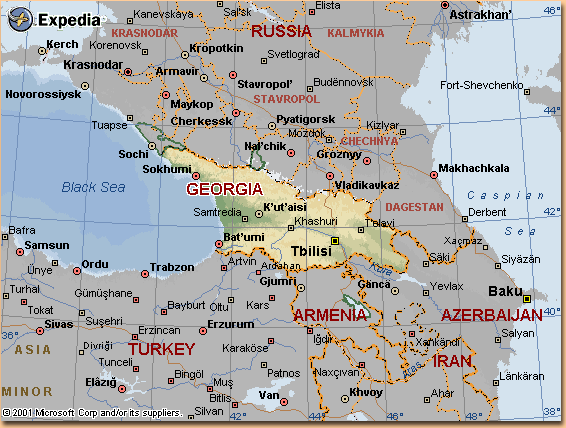
Posted on 01/21/2006 7:52:16 PM PST by Tailgunner Joe
Russia's use of natural gas to exert economic and political pressure on Ukraine has caused grave concern in the West. But Russia's pressure on Georgia has been even heavier - and has scarcely been noticed.
In Georgia, as in Ukraine, Russian President Vladimir Putin seeks to implement the doctrine of a "liberal empire" put forward in October 2003 by Anatoli Chubais, the chairman of United Energy System (RAO UES), Russia's energy monopoly. According to Chubais, Russia will never find a place in either NATO or the European Union, so it must create an alternative to both, a new empire of its own.
It can do this by using its huge and rich public-private monopolies to take over the key industries and economic institutions of former Soviet republics, thereby laying the groundwork for political domination. The resulting empire will be liberal, according to Chubais' definition, because it can be built with money rather than tanks.
Russia's first step in fulfilling this plan in the South Caucasus was directed against Armenia, its strategic partner in the region. Seizing on a $93 million debt that Armenia owed to Russia, the Putin administration demanded payment in either cash or equity in Armenia's major industries. Cash-strapped Armenia had no alternative but to hand over the shares, which it did in a 2002 treaty candidly titled "Possessions in Exchange for Debt" - a reminder of the infamous "debt-for-equity" swaps of the Yeltsin years (another Chubais invention), which spawned Russia's oligarchs.
Russia's second step in rebuilding its empire in the Caucasus is to unite itself and Armenia in a single economic zone. Because Georgia stands directly in the geographical path to realizing this goal, Russia had to deal with it first. In the 1990s, it used crude political pressure to bring Georgia into line, but it shifted to economic leverage in 2003. When U.S.-based AES Silk Road failed to transform Georgia's energy system, Chubais' RAO UES bought AES's holdings and other assets that amounted to 75 percent of the country's electricity network.
Then came Georgia's "Rose Revolution." Many state-owned firms were privatized for ten times the sums yielded in asset sales under the previous government of Edvard Shevardnadze. But an utter lack of transparency allowed Russian companies, and their subsidiaries registered in third countries, to snap up most of the new offerings. Typical was the Russian holding company Promyslennye Investory (Industrial Investors), which managed to get a major gold mine and then half of a plant producing gold alloys.
Russia's main foreign policy instrument in Georgia is Gazprom, the state-controlled gas monopoly. Gazprom's aim is to control not only the gas industry in Georgia, but also the only pipeline that feeds Russian gas to both Georgia and Armenia. Had the United States not intervened in 2005 with $49.5 million to rehabilitate the pipeline, it would have ended up in Gazprom's hands. Even then, pressure from Moscow may result in joint Russian-Georgian control of the pipeline, if not its outright sale to Gazprom. The Georgian government, without clear support from the West, may yet agree to such a deal, something that Moldova, which saw its gas cut off on Jan. 1, has just done.
Gazprom is not the only state entity carrying out Russian policy in the South Caucasus. In 2004, Russia's state-owned Vneshtorgbank acquired a controlling stake in Armenia's Armsberbank. The following year, Vneshtorgbank purchased a controlling stake in the privatized United Georgian Bank, Georgia's third largest. In effect, Vneshtorgbank renationalized United Georgian Bank, but the new owner was the Russian state.
Recently, Chubais' RAO UES has had the lead role in integrating Georgia into Russia's "liberal empire." When the Georgian authorities announced plans to privatize the Inguri Power Plant and renew construction of the long-stalled Khudoni Power Plant, slated to become Georgia's largest, RAO UES immediately began staking out a dominant role for itself in both projects. The combination of massive pressure from the Russian side and silence from the West could leave Georgia's entire power system - both gas and electricity - in Russian hands.
Russia's scheme to rehabilitate the rail line from its territory into the secessionist Georgian province of Abkhazia similarly mixes economics with neo-imperial aspirations. Even though it is focused on land that the United Nations recognizes as part of Georgia, the main beneficiaries of this project would be Russia and Armenia.
If the international community allows this scheme to go forward, it will have endorsed Russia's effort to separate Abkhazia from Georgia. Parallel with this, Russia and Armenia are planning a new rail link to Iran. Besides its obvious benefits to Iranian President Mahmoud Ahmadinejad's retrograde government, this will deftly weaken the South Caucasus's links with the West, which the United States and Europe have spent a decade fostering.
Thus, Russia's effort to entrap Georgia and its neighbors in the nets of its new "liberal empire" is part of a well coordinated attempt to reorient the South Caucasus as a whole towards the anti-Western coalition of Russia and Iran. Western countries and the United States in particular, must provide firm backing and support to the South Caucasus to prevent Russia from realizing its destabilizing and dangerous neo-imperial dream.

Putin is a hardline communist. He just hides it for now.
Yeah, and that whole "flat tax" thing he implemented is just a smoke screen to fool us into thinking he's not a commie, and he's really just waiting for the right moment to reinstate a confiscatory progressive tax system (like ours).
Some say he is a real christian.../Just a sarcastic remark.
So, now we can call Russia as evil Liberal imperialists, linking western Euroliberals as imperialists too. Good!
Disclaimer: Opinions posted on Free Republic are those of the individual posters and do not necessarily represent the opinion of Free Republic or its management. All materials posted herein are protected by copyright law and the exemption for fair use of copyrighted works.